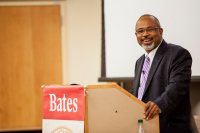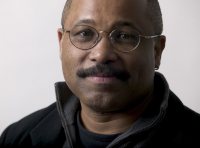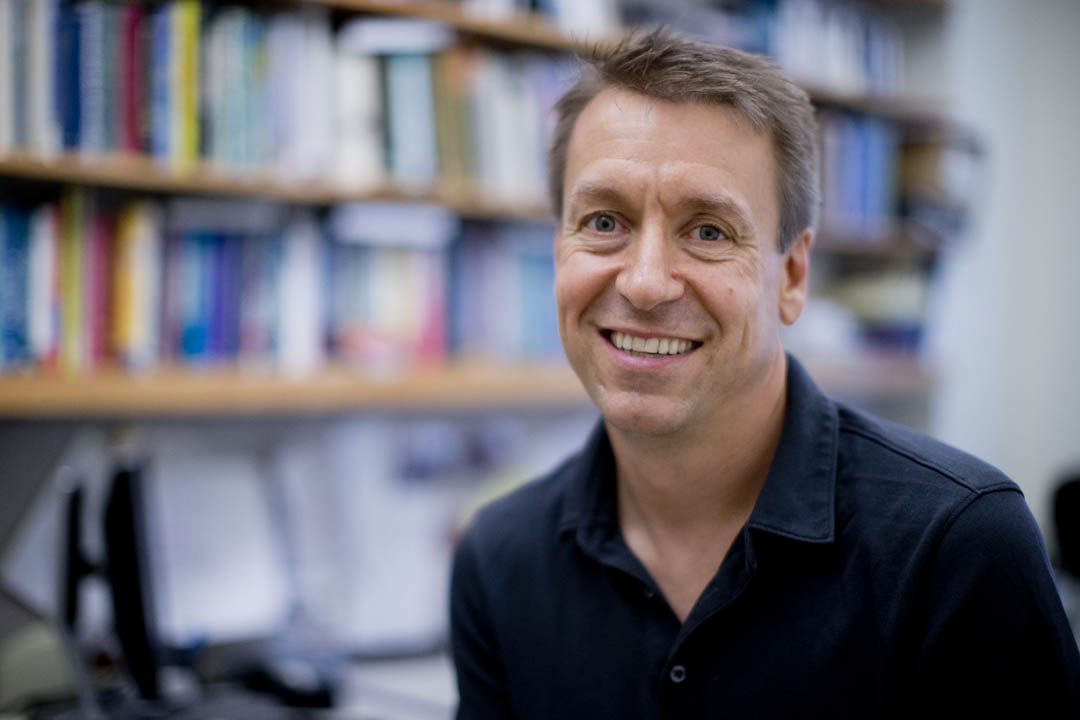
Professor wins Warhol grant for book on artistic rituals of death and loss
Myron Beasley, Bates College assistant professor of African American Studies and American Cultural Studies, knows a lot about how artists in the African Diaspora explore and represent death, loss and politics.
With the help of one of this year’s major grants from The Creative Capital – Warhol Foundation Arts Writers Grant Program, Beasley will soon make that knowledge more widely available through a new book he’s completing.
“The book situates artists as cultural workers and theorists of contemporary cultural politics,” Beasley says. “It will be a mix of ethnography, anthropology, art and politics.” His goal is to create a cross-over text that has the integrity of an academic publication and the accessibility and visual imagery of an art book for general readers.
According to the Warhol Foundation, the grant of more than $35,000 is “designed to encourage and reward writing about contemporary art that is rigorous, passionate, eloquent and precise, as well as to create a broader audience for arts writing.”
Myron Beasley discusses Haitian notion of death
“The jury appreciated Professor Beasley’s rigor and passion, and his ability to bring ‘to life’ these rites around death,” says Pradeep Dalal, director of grants and services for The Creative Capital – Warhol Foundation Arts Writers Grant Program. “They felt that he is really inside the culture he is investigating, and they were interested in the way he wants to write the book ‘as one that sits at the intersection of art writing, ethnography, and travelogue.'”
Jill Reich, Bates Vice President for Academic Affairs and Dean of the Faculty, said, “Professor Beasley is one of those scholars whose work is both authoritative and accessible, making it of great value to other scholars and the public alike. He demonstrates the relevance and importance of research in the humanities and the social sciences, as well as how those fields are interrelated. We at Bates are delighted with the recognition of his talents through this award and the support it will provide for making his work more widely available.”
Beasley says that the book will include references to artists from the Central African Republic to the United States, but a major part of the book — tentatively titled Reciting Sites: Rituals, Death and Loss — will focus on his years of research in Haiti.
“I have not met a person that went to Haiti who has not been moved one way or another,” he says.
While the world focuses on Haiti’s enduring material poverty, Beasley sees a special kind of wealth in Haitian expressions of art and culture. As an example, he points to the artists of the Grand Rue: “In an old junkyard in the center of Port-au-Prince, they make these magnificent sculptures out of debris and junk that we’ve dumped in Haiti. On one level you can say, ‘Oh how cute, they are making do with what they have.’ But on another it’s ‘Hold on, they are actually making this huge social critique about consumption, and about how we are treating “non-developed” worlds.’
In December 2009, Beasley curated the first Ghetto Biennale in Port-au-Prince. Sculptors of the Grand Rue served as hosts of Ghetto Biennale. They sent invitations worldwide to fine artists, filmmakers, academics, photographers, musicians, architects and writers, asking them to come to the Grand Rue “to make or witness work that will be shown or happen in their neighborhood.”
Beasley left Haiti three days before the devastating Jan. 12, 2010 earthquake. “I just wrote a piece about my return to Haiti after the earthquake,” he says. “I think probably the most haunting thing for me was looking for people in places that no longer existed.” [SEE VIDEO]
On his website, Beasley describes his research as “in the realms of intercultural performance, a paradigm that critique, explore and interrogate the theories of human communication with special attention to the oral performance of narrative and cross cultural engagement. My over-arching research questions concern the transference/performance of indigenous ritual and shamanistic practices from Africa to distinct communities in the western hemisphere. I consider the performances of traditional ritual practices in contemporary society as more than just spiritual and mystical performative acts; rather ritual is a vehicle by which one can extrapolate (both political and religious) meaning in the contemporary world. Through the use of ethnographic methodologies my work reveals a glimpse of the complexities of human social interaction through ritual performance.”
Professor Beasley’s publication in the journal Performance Research: “Vodou, Penises and Bones: Ritual performances of death and eroticism in the cemetery and the junk yard of Port-au-Prince” Volume 15, Issue 1, March 2010, pages 41-47




